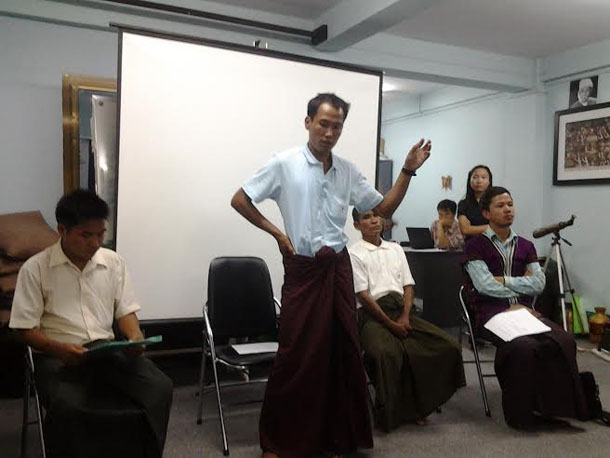By FELIZ SOLOMON / THE IRRAWADDY| Friday, January 16, 2015 |
RANGOON — A high-level delegation of US officials on Thursday concluded a two-day US-Myanmar Human Rights Dialogue, the second iteration of what could become a regular affair between the US State Department and the Burmese government in efforts to smooth the edges of a once-rougher regime.
Speaking to reporters in Rangoon on Friday, US Assistant Secretary of State for Democracy, Human Rights and Labor Tom Malinowski said that while the discussions were “extremely constructive,” issues such as ethnic and religious intolerance pose an urgent threat to creating a stable democracy in Burma.
“The use of religion in particular to divide people, whether it is done for political or other purposes, is incredibly dangerous,” Malinowski warned, emphasizing that religious extremism could have severe consequences particularly in an election year.
Malinowski led the senior delegation, which included Lt-Gen Anthony Crutchfield, deputy commander of the US Pacific Command, on his second visit to the country since the United States began limited military cooperation with the Burma Army. Envoys representing departments of religious and refugee affairs were also among the convoy that coursed the country meeting civil society, military and government actors.
Following a visit to the Kachin State capital Myitkyina and workshops with women, ethnic and mainstream rights activists in Rangoon, the delegation headed to Naypyidaw for closed-door talks with Union ministers about the nation’s most pressing human rights concerns, including land policy, the rights of ethnic minorities and the role of the military.
The most urgent concern, he said, was ethnic and religious intolerance being used to divide communities, particularly in Arakan State, where more than 1 million Rohingya Muslims remain stateless and vulnerable. Malinowski urged the government to allow unfettered humanitarian access to internally displaced persons (IDPs), revise a plan that in its current form would either confine Rohingya to camps or risk deportation, and ultimately create a non-discriminatory path to citizenship.
Regarding the Burmese government’s handling of Rohingya statelessness, who bore the brunt of ethno-religious riots in mid-2012 and still face extreme disenfranchisement and often abuse by their Arakanese Buddhist neighbors, Malinowski said that, “I personally don’t view this as a question that has been resolved.”
While ethnic and religious intolerance dominated much of Friday’s briefing, Malinowski detailed a list of ongoing human rights concerns that arose from discussions with activists and other stakeholders during the delegation’s visit. Concerns about land policy, political detention and the right to peaceful assembly were shared across ethnic and religious boundaries, according to several activists who met with the delegation earlier this week.
Malinowski was appointed in April 2014 after 13 years as the Washington director of Human Rights Watch (HRW). His former colleague, HRW senior researcher on Burma David Mathieson, referred to him as “one of the founding fathers of US policy on Burma,” remarking that under his tenure the State Department has shown a sincere commitment to rights in Burma.
The State Department’s engagement with Burma has rapidly accelerated in recent years; full diplomatic relations were restored in 2012, economic sanctions were eased in 2013, and Malinowski announced during his last visit in mid-2014 that the US military was ready to begin “cautious engagement” with the Burma Army.
Engagement with Burma’s notorious military has been a frequent point of criticism among civil society, according to Salai Za Uk, director of the Chin Human Rights Organization, who attended a conference with ethnic activists hosted by the State Department earlier this week. While US law places explicit parameters on military-to-military cooperation, many activists still think the move is premature.
“If it’s all about teaching the Geneva Conventions, that’s OK,” said Za Uk, “but the mere fact that [the United States] is engaging with the Burma Army might embolden them.”
This week’s conference came in the wake of a recent state visit by US President Barack Obama that was both preceded and followed by dark marks on an already blackened military record. Less than two weeks before Obama’s arrival, a leading Harvard-based legal clinic published research implicating Burma’s home affairs minister and two other officials of war crimes linked to an offensive against the ethnic Karen minority less than a decade ago. Not a week after the president left Burma, the army fired several rounds of artillery onto a rebel training facility in Kachin State, killing 23 cadets and injuring more than a dozen more.
Malinowski conceded that while progress on human rights in Burma has proven to be a long and still precarious process, “three years ago we could not have done this.”
http://www.irrawaddy.org/burma/us-rights-envoy-warns-dangerous-intolerance.html

